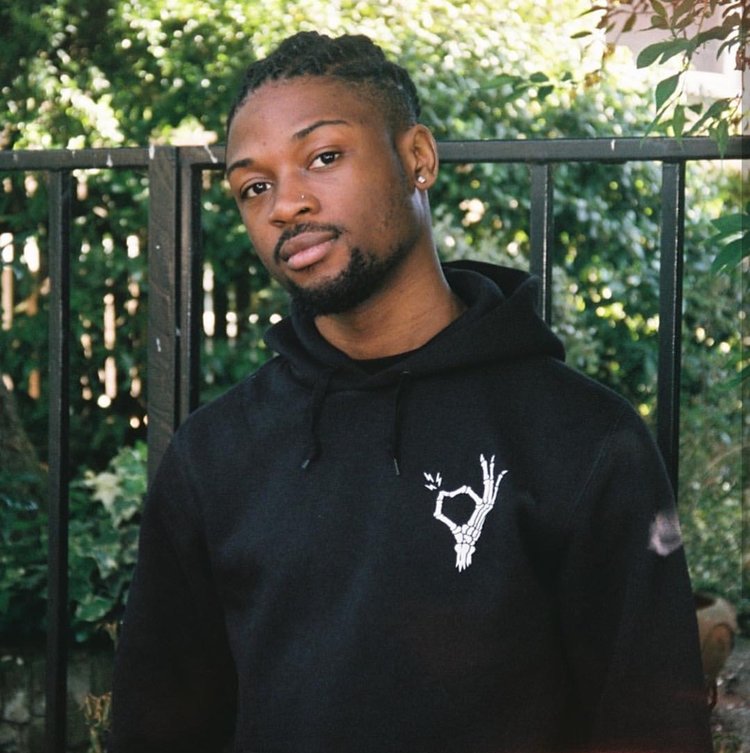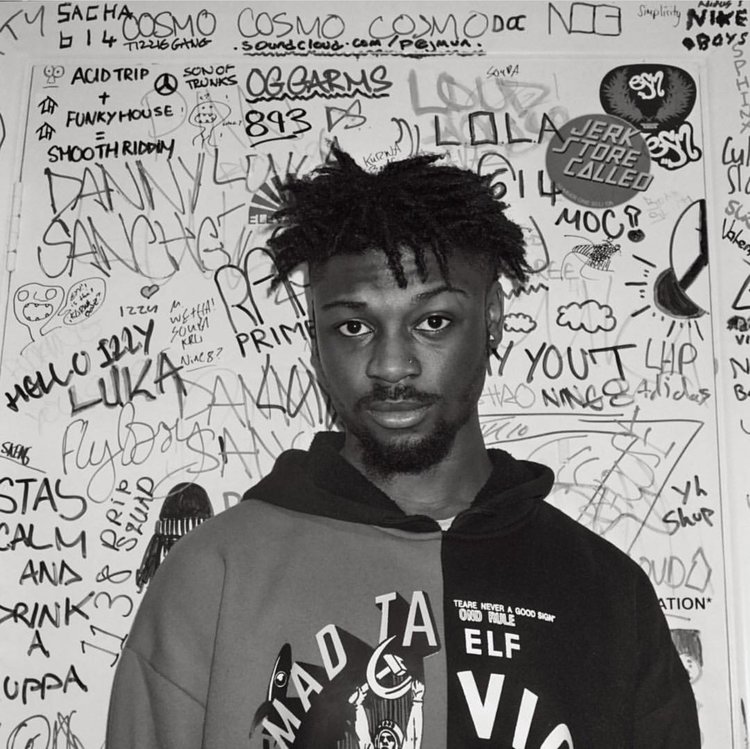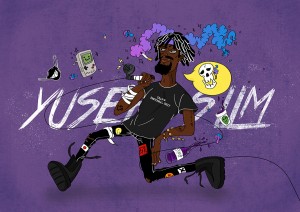Music as Therapy, Life as Narrative: An Interview with yusef slim

By Tola Ositelu
An interview nearly always takes on a life of its own. Some more than others. No matter how carefully prepared the journo, experienced or novice; regardless of how much you try to guide the conversation, the most dynamic subjects will defy time-constraints and topical confines. 23-year-old Brixton-born, Croydon-based lyricist yusef slim is one such example. Two hours pass before we can call it a day. It’s hardly surprising, given the rawness and sincerity of his material that the discussion covers so much breadth. The end result is a thesis rather than an article. What you are about to read is a mere snapshot.
Despite coming from solid musical stock, with close and extended family involved in various aspects of creativity, slim initially had an aversion to it as a career. He describes himself more as a literary youngster. He came into his own during his second year as an English Literature student at Dundee University.
‘The way I write poetry begs to be performed. It’s hard to see that sometimes as I know how it sounded in my head when I wrote it.’
How would he distinguish his former style from Spoken Word or Performance Poetry?
‘My use of refrains,’ he replies, quick off the mark. ‘It wasn’t really common in poetry. In a musical sense it would be like a hook.’
After sharing some of the fruits of his experimental labour on Tumbler, which were warmly received, yusef released an e-book of poetry under his birth moniker (yusef slim is a stage name). He is not as fond about the project now. It’s one of the reasons he won’t divulge his real name, so the curious won’t be able to locate it online.Nevertheless, the positive response to his early poetic efforts inspired slim to consider self-publishing again. He shared some of his nascent ideas for second book Aqua Gold with the man who would be his final year lecturer and future artistic mentor.
‘Over the summer I emailed him this project. He came back to me and said, “I really like the title. I like what you’re talking about but the way you write would go better if it were accompanied by music.” He said specifically: “If you were to do Hip-Hop or R&B, I think that would go really well for you”. Initially, I was really offended…’
What a strange reaction…
‘It was,’ yusef agrees. ‘I was so upset. I had put in all this work and then – to my mind at the time – someone who was just a 60-year-old white man who’d lived in Scotland all his life, says “You should do Rap!” I felt dismissed.’
The irritation subsided once slim enrolled in his class.
‘I started to see what he was talking about. I could see how other people in my class wrote. Then the semester finished. I’d become really close to him. I thought, I’ll see where he’s going. I’ll try [music] out.’
In a sad twist of fate, yusef’s mentor was not around to see him graduate.
‘On my graduation my lecturer passed away. That kind of put a lot on hold. It was really difficult for me to adjust. I stopped writing completely for about three or four months. It felt like every time I went to write the whole wave of emotions came back.’
In spite of his grief, some friends convinced slim to pick up his pen once more. He released two singles, one of which, Croydon North, eventually clocked up thousands of plays.‘After that I never looked back’.
Despite his late mentor’s recommendation and growing up with parents who were ardent Hip-Hop fans (slim’s mother loved West Coast G-Funk and KRS-One, his dad favoured Biggie, Nas and Jay-Z), yusef didn’t automatically gravitate towards rap.
‘No-one cared about Wu-Tang Clan when I was 5 or 6. They cared about the Spice Girls and N*Sync so that’s what I was listening to…’
As an adolescent, slim’s palate diversified considerably.
‘I was a little bit weird. My personal taste was so wide. People say that, but they usually just mean different types of Hip-Hop. I used to listen to Death Metal. I really like ‘80s and ‘90s pop music, Dubstep, Dancehall, Reggae, Psychedelic Rock, even Techno… There’s no genre anyone can say to me that I’d immediately dismiss. I will listen to anything.’
There are, of course, enduring influences. Yusef counts amongst them Nirvana, Barrington Levy, Kid Cudi and David Bowie. Slim insists he was a fan before he died. ‘He’s from Brixton. Growing up, we knew who he was. They used to talk about him in the barber shop and stuff.’

When it comes to his own music, yusef abides by certain guiding principles.
‘One of my core philosophies has always been, no matter what song I make, at the end of it you should be able to say what it’s about. There is some music I listen to and I enjoy it, but if I were to try and tell you what it’s about, I couldn’t really. The narrative goes all over the place like a lot of the mumble rap you hear now … Beats and flow are what people are leading with, which is fine,’ he hastens to add.But it’s not the artist he wants to be. ‘When I write, I want this just to sound good or I want someone to sit down and digest what I’m saying. More often than not I go down the latter path. My music is sort of my therapy. I struggle to write songs that are airhead, happy rubbish because I just don’t feel that.’
When yusef slim says he’s intentional about his music, it’s no bluff. His previous release Save Me, which he describes as his best work, is a very deliberate 25 minutes long. He explains the idea behind such precision.
‘It was done on purpose to mimic the 25 minutes that I sat on a bridge in East London and I nearly jumped off. I went through a full range of emotions in that time and that’s what the tape reflects. I don’t dramatise or overdo things to make them fit a narrative. Everything I say either did happen or does exist. My life is a narrative because it’s a life.’
Slim credits his English Lit degree for the form of the record. Besides contributions from producers Ouija and Ivan, it was virtually a self-sufficient project, recorded in his bedroom studio.
He originally wrote songs for Save Me over a two month period, whittling it down eventually to 11. The culling procedure was, in his own words, brutal.‘If I record a song, and it doesn’t sound like it did in my head, I drop it. There’s a lot that’s on the cutting-room floor. I can hear it, but it will never be released.’
The process isn’t completely monocratic. Slim seeks the wise counsel of a posse of fellow creatives.
‘I have three friends that I’ve known since I was about 13, who are super into Hip-Hop. I use them as quality control to some extent. If it passes my own quality control, then I’ll go to them and say what do you think of this? They won’t like everything, but I can gauge from how they receive it whether it’s good or bad, at least from a technical standpoint. Even if they don’t like it, does it sound right?’
Yusef is painfully honest in his lyrics. His candour on Drugs about how using substances can affect relationships is alarming. On Thank You Cudi he wrestles with self-loathing. He’s also been extremely open about his struggles with depression and how it affects his art. His frankness is refreshing in light of lingering stigma around mental illness, especially amongst the male population.
‘I was diagnosed with borderline personality disorder when I was 21,’ he shares. ‘There was a central trigger. When I was 16 I had what they call a cardiac episode playing football. I almost died and that sent me spiralling then and there. I never really recovered.’
Several years lapsed after the initial trauma. Following a particularly bad reaction to a drug cocktail, a flatmate’s intervention was the impetus for slim to seek help.
‘Getting the diagnosis kind of freed me from the ups-and-downs. Before that I was thinking, what’s wrong with me? Why do I have no control? I want to but I’m not strong enough to do it, which I feel bleeds out into the music so much.’slim acknowledges that artistic sincerity can be a delicate balancing act.‘When I talk about the drug aspect and the depression that comes with it, my worst fear was that I would be glorifying it. I’m very aware of that. I’m always presenting the reality [of drugs] for a lot of people. It’s not just what you did at the party. There’s the other side to it.’
The conversation turns to what yusef describes as a “massive desensitisation” to not just drugs but violence. He believes Call of Duty exemplifies the problem.
‘It won’t make the majority of people want to go out and shoot someone, that’s true. But a side effect is a massive desensitisation to violence.’
Keeping with the theme of post-modern western society’s apparent glibness about potentially destructive behaviour, yusef thinks this extends to the extreme end of self-harm.‘I hate when people decide they’re going to be a martyr in death. I have a hatred for Netflix show 13 Reasons Why [about a teenager who takes her life]. For me it was totally disrespectful.’
Having been on the brink himself, yusef is sensitive when addressing the issue.
‘I didn’t want to portray the image that it’s a good thing. Obviously, it’s not. At the same time, I didn’t want to start attacking people who felt like that. If there were a conflict, neither side is in the right, which is what I talk about.’
Is there a more constructive way for a concerned friend or loved one to intervene?
‘In my experience the biggest thing is the feeling of isolation. If you can support someone and not let them feel so isolated – I’m here for you. I care for you – that would have a bigger impact than telling them people will miss them.’ He continues: ‘To anyone who is listening to my music; you are not alone. There are people who go through this that you don’t expect; who put on a brave face. Try and get as much positive energy and get rid of people who don’t add that to your life. There’s a lot of access to online therapy. You don’t need money for it. I would encourage people to use those. Confide in people who can help you.’

I ask slim if there is anything in particular that frustrates him about how the issue of mental health is approached from a socio-political perspective, especially for men.
‘I think the aspect of weakness is more intense for males, simply because society allows women to be a bit more emotional. You’re more likely to talk to your friends about these feelings because it’s been accepted since you were young. Males are often stigmatised. If you mention any of this stuff, you’re weak.’To illustrate, yusef chooses an oft-cited and divisive example, although his stance is more sympathetic than some.‘I’m not a huge fan of Drake and some of the stuff he says I can’t get on board at all [but] I appreciate some of his music. He talks about being emotionally vulnerable and insecure in his relationships quite a lot. They call him weak… At least he’s trying.’
Moving away from pop culture, slim believes there are more insidious obstacles to a helpful conversation about mental health.
‘The phrasing in society of certain issues has become so flippant and callous. People don’t even realise what’s going on. “Oh, I’m so depressed,” because they’re sad one day. No, you’re not. That’s not the same thing. People often joke, “It makes me want to slit my wrists”. That’s not okay. You don’t know what people are going through. Making off the cuff comments like that is perfectly acceptably by the way. You can say those types of things and no-one will be shocked. I’ve been in situations, and it’s made me feel uneasy.’
Surprisingly, yusef is reluctant to take a political angle in his music.
‘On previous projects, I addressed how the government treats certain groups, but I moved away from that. I could tell you that mental health and the NHS are super-underfunded but for someone who’s going through the issue, that’s not helping. It’s too clinical. Anyone can reel off facts about how prevalent it is in society. Great. I’m glad you’re bringing awareness, but I can’t relate to it. You don’t get the person behind it, which is why I’m so open. What I won’t do is present a series of facts. You have Google for that.’
His obvious thoughtfulness notwithstanding, there are times when yusef’s unfiltered honesty is given to misinterpretation. The lyrics for Drugs for example seem prima facie, quite misogynistic. Does he ever worry about being misunderstood?
‘Sometimes I do. That song in particular, I think that’s the only one on Save Me, if you were to just listen to in isolation, you might not get it. But I think it’s important because it’s a critique. “Look how horrible I sound as a person right now!” You can be blinded by substance abuse.’We further discuss songs that have purportedly been misrepresented because of a superficial reading of the lyrics. Bruce Springsteen’s Born in the U.S.A. comes to mind. slim proffers Kendrick Lamar’s Swimming Pools and Smells Like Teen Spirit by Nirvana.‘That’s why those types of songs for yusef slim are few and far between,’ he stresses. ‘People will just take things at face value. I [only] do it when it makes sense’.
Yusef has just re-released some older material whilst he beavers away on a new, grander project slated for a summer release. It’ll fuse his twin passions of literature and music.‘The biggest influence is Alice through the Looking Glass,’ he reveals ‘There are a lot of references to the book on the album. It is nonsense; it doesn’t make sense but at the same time it does. There is an element of storytelling that’s been lost in a lot of genres of music. You have a series of good songs which is fine but if you don’t have that narrative element it could seem disjointed. Unless it’s intentional, being disjointed seems lazy to me.’
 ‘I’ve also decided to really cut back on cursing. If you swear all the time it loses its impact. I feel as an English Lit graduate if I can’t find a way of expressing myself without resorting to cursing, then I’ve missed the whole point of having a degree.’
‘I’ve also decided to really cut back on cursing. If you swear all the time it loses its impact. I feel as an English Lit graduate if I can’t find a way of expressing myself without resorting to cursing, then I’ve missed the whole point of having a degree.’
There’s one particular audience whom yusef has in mind for the record.‘I feel like I can’t usually play music for my mum, simply because it sounds so dark. You don’t want your family to hear that as it’ll worry them. My mum could be my biggest fan. She and my sister really support everything I do’.The forthcoming homage to Lewis Carroll is set to change things.‘I played the first verse of one track for my mum and she was like “Oh my God! This isn’t all depressing and sad. I can actually listen to this”. If I can share a whole song with mum and she likes it, even if it’s only one on the album, I’m winning’.
Online support:
https://www.elefriends.org.uk
https://www.mind.org.uk/
http://www.sane.org.uk/what_we_do/support/supportforum/
This is an edited version of a two part interview: Part 1 & Part 2.



Your article on topic is well-researched, and I appreciate the detail of your analysis. Thank you for sharing your knowledge.